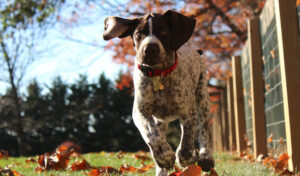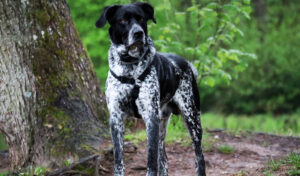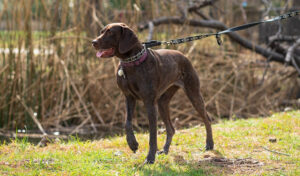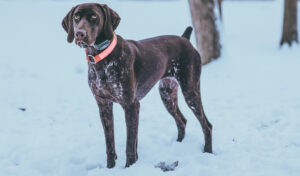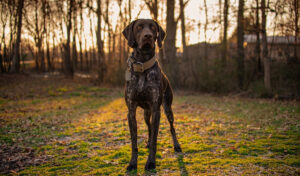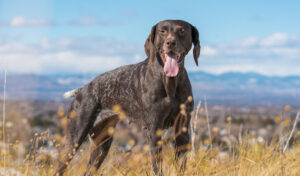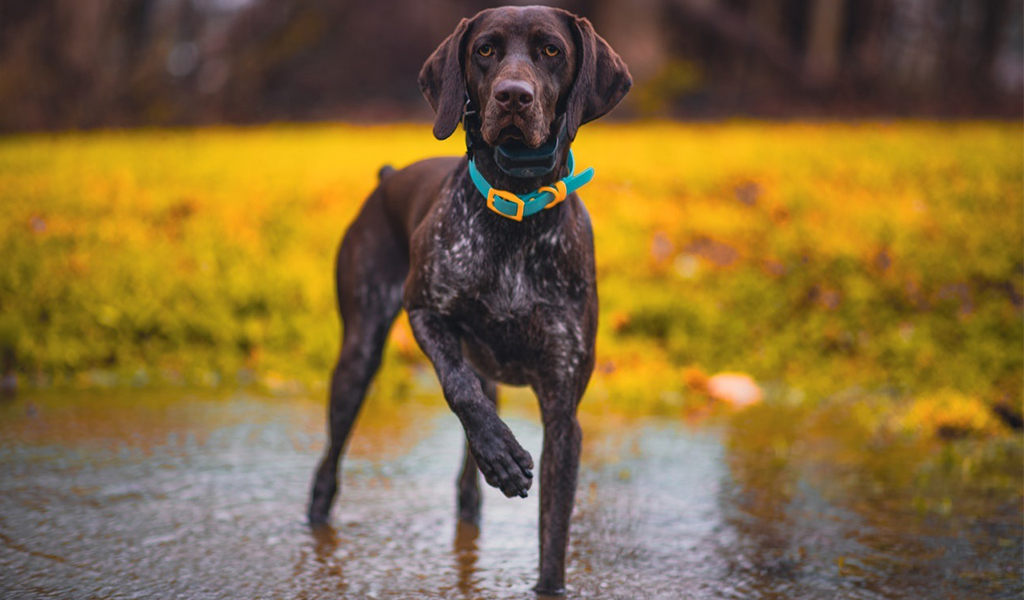What is a German Shorthaired Pointer Dog Breed?
The German Shorthaired Pointer Dog is a multi-talented and medium-sized pointer that thrives on intense activity, creative instruction and lots of affection. The medium to large breed of pointing dog, the German Shorthaired Pointer was created in Germany in the 19th century for hunting.
They have muscular legs and attractive bodies. Despite being a hunting breed, they still have a strong desire to hunt and chase prey. They are extremely enthusiastic and skilled in various dog sports.
Content Overview
- History
- Different names
- Appearance and Characteristics
- Personality and Temperament
- Health & problems
- How to take care
- Puppy Information
- Puppy price
- Things to consider adopting a puppy
- Advantages & Disadvantages
- Photo gallery
German Shorthaired Pointer Dog History
German hunters combined many breeds for years before settling on this adaptable bird dog in the 1800s. Because of its success, the German Shorthaired Pointer continues to be one of the top winning breeds in hunting competitions.
The dog’s ancestors may be found in the 1600s, when a hefty Spanish pointer and a Hanoverian hound were combined to create a Dog that was interested in both raising animals and pointing birds. If required, these multi-purpose hunters may even take down injured prey.
The breed developed more fashionable pointing power through later crosses with the English Pointer. The current German Shorthaired Pointer is said to have originated from these two dogs “Nero” and “Tref”. Since then, the German Shorthaired Pointer has gained a worldwide reputation as the best dog for anyone looking for a versatile hunter.
Different Names or Types
German Shorthaired Pointer Dog Other Names
- Deutscher kurzhaariger Vorstehhund
- Deutsch Kurzhaar
- GSP
- DK
- Kurzhaar
Recognized Names
Recognitions
- ACA: American Canine Association Inc
- ACR: American Canine Registry
- AKC: American Kennel Club
- CKC: Canadian Kennel Club
- DRA: Dog Registry of America
- FCI: Fédération Cynologique Internationale
- UKC: United Kennel Club
Appearance & Characteristics
The German Shorthaired Pointers have a short, flat coat with a thick undercoat that is protected by stiff guard hairs. As a result, the German Shorthaired Pointer is an extremely effective hunter on both land and water.
The hue can be described as dark brown with lighter brown shades known as “liver”, black, white, liver roan or liver and white. The body usually has a liver and white streaks or “ticks”, while the head is usually a solid color.
There are also full livers and solid black coats; Occasionally, the chest is spotted or has a slight sheen of white. Although the German standard permits a light sandy color on the extremities, this coloration is unusual, and any dog showing yellow is disqualified from AKC and CKC competitions.
Breed Basic Characteristics
- Country of origin: Germany
- Breed group: Sporting
- Life span: 10-12 Years
- Size: Medium
- Height: 21-25 Inch
- Weight: 45-70 Pound
- Coat: Short
- Type: Purebred
- Shedding: Seasonal
- Colors: Brown, Chocolate Liver, Black and White.
- Also as known: GSP, Deutscher kurzhaariger Vorstehhund
- Good with children: Yes
- Personality traits: Friendly, Willful, Outgoing and Playful
- Barking: When Necessary
- Eyes: They should have almond-shaped, dark brown eyes.
- Ears: Their slightly rounded, floppy ears
- Body: Medium body
Coat
The German Shorthaired Pointer has a short, flat coat with stiff guard hairs that protect the deep undercoat, making the coat water resistant and keeping the dog warm in cold weather.
Color and Markings
Common coat colors for this Breed include.
- Black
- Black & White
- Liver
- Liver & White
- Liver Roan
- White & Liver
- Black Roan
Coat Color and Markings
German Shorthaired Pointers are endowed with the recessive genes that produce different hues of liver and white.
Personality and Temperament of German Shorthaired Pointer Dog
The German Shorthaired Pointer has a keen mind and a kind disposition. He is enthusiastic about whatever he does without being angry or sloppy. He does not enjoy being by himself, though, and might have separation anxiety. This dog lives inside, not in a yard or kennel.
The German Shorthaired Pointer was bred to be both a proficient hunter and a household dog. Since it is cooperative and simple to teach, its disposition is that of a clever, brave, playful, and typically loving dog. Genetics, education, and socialization are only a few of the many influences on temperament.
Puppies with good dispositions are lively and inquisitive and are eager to approach and interact with humans. In order to produce a well-behaved family dog, training is very necessary due to the breed’s demand for activity and its innate propensity to hunt.
Activity Requirements
The German Shorthaired Pointers should have at least one to two hours of vigorous activity per day which should ideally be split into two separate sessions, morning and evening. They will need the brain stimulation that puzzle toys and brain games can provide.
Running, swimming, and dog sports are all great forms of exercise for dogs, as are other activities that allow them to burn off some of their boundless energy while spending time outside with a human companion. This can take the form of a brisk 30-minute walk or run in the morning and evening and enjoying a safe, enclosed space.
The German Shorthaired Pointer is intelligent and athletic, excelling in dog sports that challenge both body and mind, including agility, obedience and dock diving.
Trainability
The German Shorthaired Pointers are highly intelligent and eager to please their owners. The German Shorthaired Pointer requires more initial training than any other breed. Classes should also be taken to socialize puppies and train them in basic obedience commands. This breed is intelligent and picks things up easily with regular training sessions.
The training enables German Shorthaired Pointers to simultaneously fulfill their passion for work and their desire for human connection. They need an owner who leads an active lifestyle to channel their high energy and intense hunting drive into creative activities.
They are easily put off by anything they see and smell because they were designed from birth to hunt. German Shorthaired Pointers generally get along well with humans and other dogs, but you should take them outside often to meet new people. They meet new people in one place and learn how to play properly with other puppies.
Health & Problems
German Shorthaired Pointer dogs often live 10 to 12 years and are in good condition. But a dog can occasionally experience health problems. There are various conditions that can be dangerous for this breed.
These include hip dysplasia, visual disorders such as progressive retinal atrophy, and certain cardiac problems. Breeding stock will be screened by a reputable breeder for breed-specific problems. German Shorthaired Pointers may have any of the following typical health problems:
Bloat: This is a dangerous stomach ailment that can develop very quickly and is an emergency.
Hip and Elbow Dysplasia: The painful condition that develops when these joints are improperly formed and rubbed, causes agony to the dog. These conditions can lead to lameness.
Hypothyroidism: This autoimmune disorder produces an underactive thyroid gland, which leads to an increased metabolism, weight gain, hair loss, tiredness, and other symptoms.
Von Willebrand disease: This hereditary disease causes profuse bleeding because it hinders the blood from clotting.
Feeding Plan
German Shorthaired Pointers generally thrive on quality commercial dog food. Feed the dog a high-quality food that is appropriate for the dog’s activity level and age, such as puppy, adult or senior. When the German Shorthaired Pointer reaches adulthood, morning and evening meals should be plentiful.
Puppies under 6 months of age will need to be fed more than twice a day. This breed is prone to bloat, so they should not be fed immediately after running or engaging in other strenuous activity.
They should not be allowed to run or exercise for at least an hour after eating and drinking. After completing the strenuous activity of the day, dinner would be the best time to eat.
Also Read: Weimaraner Dog Breed
Living Conditions
German Shorthaired Pointers are relatively low-maintenance dogs with short coats that require little upkeep and little shedding, aside from their love for adventure. They live an average of 10–12 years and are typically healthy dogs. They get along well with kids and other pets, and they are devoted to their family.
In order to play and run, the German Shorthaired Pointer requires room. German Shorthaired Pointers are lively dogs, which will not be good for apartment living. These dogs demand an active owner who has enough room for them to burn off all of their excess energy.
The best homes for dogs are those with sizable, gated yards because they provide the dog lots of space to go about securely off-leash. They might not be suited for intimate living arrangements like flats or condominiums due to their exercise requirements and noisy barking.
How to Take Care of German Shorthaired Pointer Dog?
German Shorthaired Pointers are often simple to maintain. They are intelligent, easy to groom, and shed only a moderate amount. The breed has a short coat and needs frequent maintenance, so shedding is not a huge worry, but it does need a lot of daily activity.
Give them a high-quality meal since they are energetic dogs that need more fat and protein in their diet than certain other breeds.
Grooming & Brushing
German Shorthaired Pointers require relatively little maintenance for most of the year. Once or twice a week, gently brush their short coats with a soft-bristled brush.
They will appreciate an occasional bath with a gentle shampoo; For these dogs, who rely on natural oils to protect their skin, twice a year should be plenty.
Regular brushing will protect the dog’s oral health and help prevent more serious health problems in the future. Regular examination and cleaning of ears and trimming of nails are advised.
Feed Healthy food
German Shorthaired Pointers are typically used for hunting birds, but they are also becoming more popular as dedicated house pets. When it comes to nutrition, high energy breeds have average needs. A dog’s stomach is not anatomically shaped to digest and ferment carbohydrates.
Maintaining a healthy weight is important for dogs, regardless of breed. German Shorthaired Pointers tend to gain weight, so their diet should include physically appropriate protein, healthy fats, pulverized bones and vegetables that are rich in vitamins and minerals important for optimal health and performance.
The following items Should never be feed to German Shorthaired Pointer Dog
- Poultry bones
- Moldy or spoiled food of any kind
- Yeast dough
- Alcohol, beer, wine or liquor
- Grapes or raisins
- Salt & salty foods
- Chocolate, coffee, or tea
- Onions, chives, and garlic
- Tomato leaves stem or unripe fruit
Puppy information
German Shorthaired Pointer Dog Puppy Training
The German Shorthaired Pointer puppy needs to be properly trained from the minute you bring it home. When you first have a dog, you’ll educate it to go potty whenever it’s convenient for you.
For the first two weeks, be ready to watch the dog’s behavior and take him outside to relieve himself as necessary. It’s important to educate, socialize, train, and teach the dog appropriate manners.
Behavioral Training
Puppies of German Shorthaired Pointers need behavioral and training instruction. If the puppy is adequately taught and rewarded, these behaviors may be readily controlled. Here are 5 methods for teaching pups that are non-violent. Always be on time, assertive, consistent, and positive while interacting with him. You should also give him timeouts.
Obedience Training
They are kind and caring, and they have a deep bond with their owner. The intelligent German shorthaired pointer dog dog breed prefers to train. They are excellent in agility and tricks. During obedience training, you can teach him a variety of useful skills, such as commanding him to come when the phone rings, lie down, use the bathroom, sit, walk, and run.
Socialization
Like all dogs, the German Shorthaired Pointer needs socialization. Socialization should ideally begin as soon as practical. Exposing the dog to different environments, situations, people, animals, sights and smells is a crucial part of socialization.
Great places to start are dog parks, pet-friendly restaurants, pet supply stores, and new walking trails. Additionally, sometimes it’s a good idea to host visitors or take a dog to someone’s home.
German Shorthaired Pointer Dog Puppies For Sale
The high-quality German Shorthaired Pointer puppy can cost up to $3,000. A typical price for a German Shorthaired Pointer puppy from a reputable breeder is between $800 and $1,500. Costs vary based on the dog’s pedigree, breed standards, age and level of training.
Things to Consider Adopting a German Shorthaired Pointer Dog
- German Shorthaired Pointers It has qualities like friendliness, zeal, devotion, playfulness, and obedience that make it an ideal family dog.
- They need to work out more. If they don’t get enough exercise, boredom can lead to bad behavior.
- The German Shorthair dog breed’s versatility is another advantage worth highlighting; as long as they have adequate room to walk around, they can adjust to the living situations.
- This breed, like other large dogs, is prone to health issues include epilepsy, bloat, hip dysplasia, eye illness, cancer, hypothyroidism, lymphedema, and joint disease.
Advantages and Disadvantages
Advantages of German Shorthaired Pointer Dog
- They make great family pets
- There are dogs with easy adaptability.
- The German Shorthaired Pointer has a low maintenance coat.
Disadvantages of German Shorthaired Pointer Dog
- They need a lot of exercise.
- They may get anxious about being apart.
- They experience more health issues.
German Shorthaired Pointer Dog Photo Gallery
